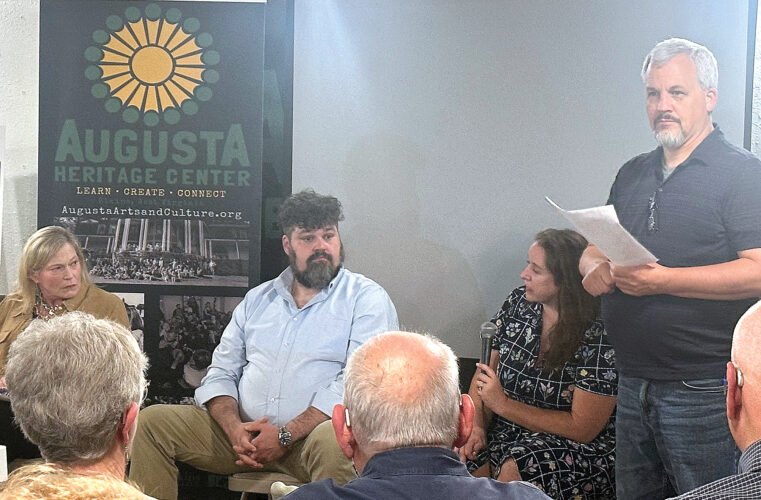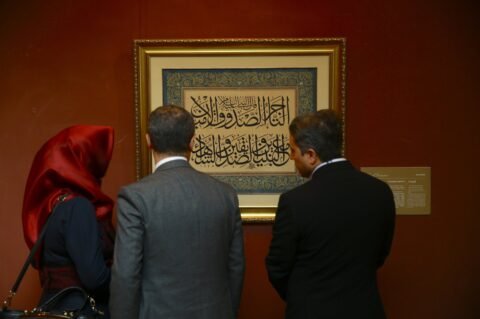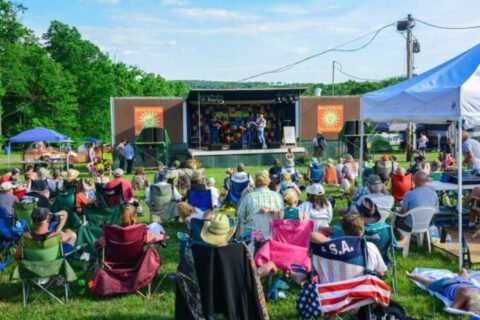
The Inter-Mountain photos by Taylor McKinnie
From left, Old Brick Playhouse Founder and Director Missy McCollam, Augusta Heritage Center CEO Seth Young,
Director of Arts for the West Virginia Department of Arts, Culture and History Jenna Green, and Artists at Work President Dan Engstrom take part in the Community Conversation on Arts as an Economic Driver Wednesday.
ELKINS — Elkins-Randolph Together presented a Community Conversation on Arts as an Economic Driver on Wednesday, with panelists from the West Virginia Department of Arts, Culture and History, the Augusta Heritage Center and The Old Brick Playhouse.
The event, which was held at the Augusta Heritage Center at 21 Third St. in Elkins, saw more than 50 community members come together to discuss the arts as an economic driver in the area. Elkins-Randolph Together is a collaboration between the Elkins-Randolph Chamber of Commerce and the Randolph County Development Authority.
The event was moderated by Artist at Work President Dan Engstrom. Guest panelists included Director of Arts for the West Virginia Department of Arts, Culture and History Jenna Green, Augusta Heritage Center CEO Seth Young, and The Old Brick Playhouse Founder and Director Missy McCollam.
Green explained how art and art tourism currently plays into the economy in the country, the state and in Randolph County. The arts and culture sector in West Virginia is a $1.5 billion industry, Green said, and is responsible for 1.5% of the state’s GDP.
“…Randolph County is leveraging more funding from the state art’s office than any of the communities that I mentioned by almost $700,000,” Green said. “This fiscal year alone, (the West Virginia Department of Arts, Culture and History) have directed up to $182,722 in art funding to Randolph County artists and arts organizations. So that’s a huge investment in the arts, and I think everyone in this room should be incredibly proud of the work they’re doing.”
Young, during his portion of the panel, discussed how the arts, especially surrounding Appalachian culture, are a perfect way to connect people in the community and around the world, and how the Augusta Heritage Center plans to build on that.
“We want to bring outside resources into Elkins to enliven our community, make it as vibrant as possible and offer as many educational opportunities as we can,” Young said. “We want that for school children, to be able to come here and enjoy after school programs, and go into schools and deliver content directly to them. We want that for family programs, so that a family can come in for a group experience and tighten their bonds together.”
During her portion of the panel, McCollam spoke on how businesses in the community, both within the arts sector and outside of it, need to come together and collaborate for events and opportunities, highlighting the power of “collective intelligence.”
“We can all do big things together, if we don’t put our personal ego into it, and that’s where I think the arts can come into it so beautifully,” McCollam said. “We all need to promote each other… we need to connect the arts sector with the business sector… so start thinking outside the box. ‘Who can I collaborate with?’”
The panel also fielded queries from the audience, who asked questions ranging from what was being done to teach art to the next generations, how artists and businesses can market themselves better, how to receive grants from the state and more.
The audience also offered up their own experiences, ideas and upcoming opportunities that could help artists and business alike. Elkins-Randolph Together also held time after the event for the audience and panelists to speak and exchange contact information to help keep the conversation active.
“The worst thing that could happen is everyone walks out and says, ‘Yes! Somebody should really do this,’” Engstrom said at the end of the event. “That somebody might be you, buddy… It’s our job as citizens of this great community to say, ‘How do we work together now to make things happen?’ They won’t happen without some ingenuity and some leadership, and that’s why you are all still here.”

Community members mingle inside the Augusta Heritage Center in Elkins before the Community Conversation on Arts as an Economic Driver begins.





